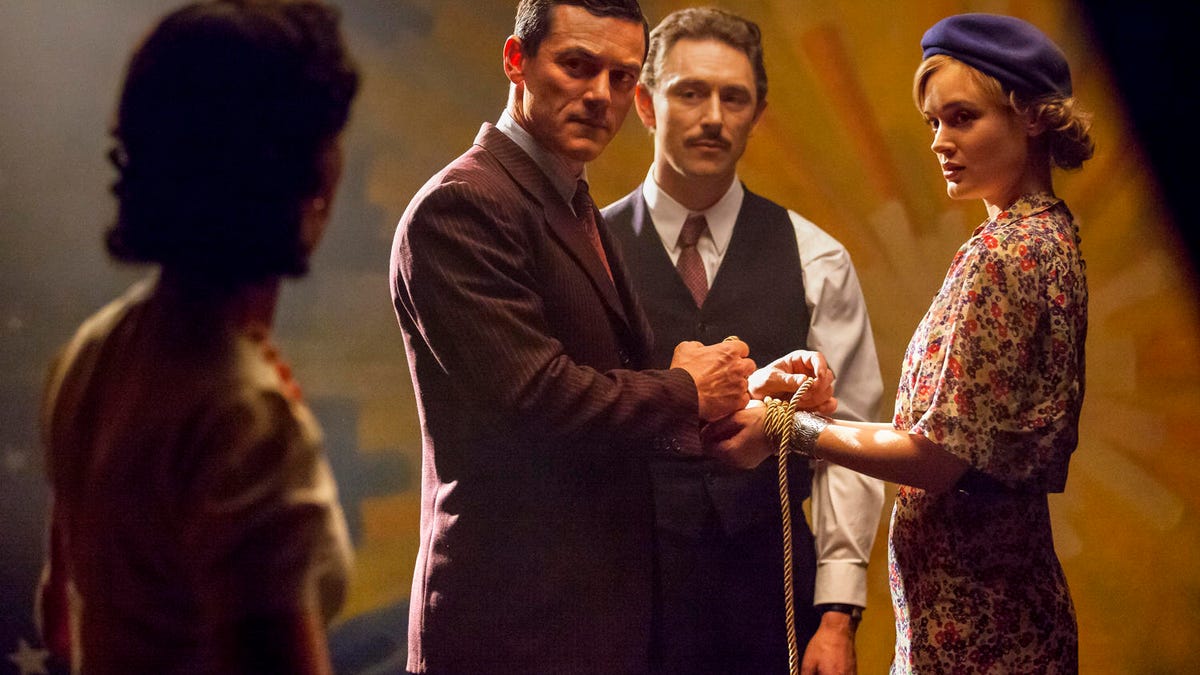'Professor Marston and the Wonder Women': Love, with ropes
It may be light on comic book history, but the hot and heavy exploration of sexual freedom in the early 20th century will lasso you in.

Let's get this out of the way: "Professor Marston and the Wonder Women" isn't a tale of superhero Diana Prince's creation. Instead, it's a story of how an unconventional family smashes taboos in the face of judgment by mainstream society, along the way examining the psychological and sexual principles underpinning the fantasy of Wonder Woman.
And yes, it gets steamy -- in a honey-tinted, prestige-period piece sort of way.
The movie is loosely based on the lives of Wonder Woman's creator, Professor William Moulton Marston (Luke Evans), his ambitious wife Elizabeth Marston (Rebecca Hall) and inexperienced student Olive Byrne (Bella Heathcote). In real life, the three lived together as a family in which both women had children fathered by Marston, and the women remained together for decades after his death. The film explores the trio's taboo-busting relationship and interest in sexual roleplay -- and rope play -- and how those influences snuck into William's superhero stories.
The film moves between the Prohibition-era 1920s, when William and Elizabeth first met Olive at the university where they taught, to their life together as a non-traditional family as William forged a career as a writer of funny books. It's framed by scenes set during the 1940s moral panic over comic books, in which William is grilled by a self-appointed moral arbiter over the Wonder Woman book's images of men and women being repeatedly tied up.
Bella Heathcote plays Olive Byrne, one of two women said to have helped inspire Wonder Woman.
While the film is too loose with the facts to qualify as a biography (which the real-life Marston family is reportedly taking pains to clarify), it makes a point to develop each of the three main characters and their relationship to each other, creating what feels like an equal domestic partnership by the film's end.
Refreshingly, this isn't one of those love triangles where women compete for one man, with the movie taking pains to establish intellectual and emotional respect between the three as well as sexual desire. While William's desire for Olive is obvious, the film also depicts a slow but lasting attraction developing between Hall's formidable Elizabeth and Heathcote's more innocent Olive.
The relationship between William, Elizabeth and Olive is depicted as being kept secret to avoid scorn from a society where gender equality barely existed, while notions such as promiscuity, homosexuality and polyamory were shamed, disgraced and even denounced as illness.
The anything-but-ordinary lifestyle is depicted as well-rounded and fulfilling, based on consent, communication and mutual respect. And the film slyly reminds us this relationship began in an era when alcohol was banned, showing that social mores change and repressive social judgments aren't always right.
While the headlined relationship has many levels to chew through, anyone hoping to learn about Wonder Woman's genesis from a movie with "Wonder Women" in the title may leave disappointed. The character's invention isn't covered until well over an hour into the film, and the movie flies right through it. To see this film tell it, Wonder Woman went from William's pitch to financial success and then controversial figure nearly overnight.
The film is loosely based on the lives of William Marston (Luke Evans), his wife Elizabeth Marston (Rebecca Hall, right) and their relationship with Olive Byrne (Bella Heathcote).
But while you might want to turn to a non-fiction book for the bare facts about Wonder Woman's creation, the film does offer deeper insight into the psychology and philosophy that makes Wonder Woman such a fascinating creation. Little hints at the famous superhero's signature elements are seeded throughout the film, with particular focus on the Marstons' breakthroughs in early lie detector technology -- it's no coincidence their relationship is built on honesty, while Wonder Woman's Lasso of Truth compels wrongdoers to be honest.
Ultimately, "Professor Marston and the Wonder Women" isn't the film you should see if you are hoping for a behind-the-scenes look at the facts and figures of the comic's creation. It is, however, is a story about a groundbreaking romantic relationship between three adults based on honesty and respect, exploring the theories and desires that inspired an iconic superhero's creation.
"Professor Marston and the Wonder Women" is in US theaters now, and opens in the UK on Nov. 10.
Update, Oct. 19, 3:55 p.m. PT: This story initially had a release date for Australia. There is no release date set for Australia yet.
Tech Culture: From film and television to social media and games, here's your place for the lighter side of tech.
Batteries Not Included: The CNET team shares experiences that remind us why tech stuff is cool.

